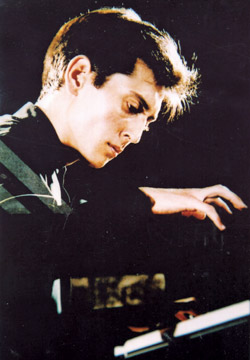Virtuoso interpreter of Chopin
 Russia has produced some of the greatest pianists who have stormed
into the international scene in the last few decades and by their
virtuosity, will occupy the pedestals on which stands their past Masters
ranging from the great Tchaikovsky to other Russian icons, in a century
from hence. Russia has produced some of the greatest pianists who have stormed
into the international scene in the last few decades and by their
virtuosity, will occupy the pedestals on which stands their past Masters
ranging from the great Tchaikovsky to other Russian icons, in a century
from hence.
These pianists whose artistry is so immaculate that Russia will keep
in command the top spot as decades roll by not only by their emerging
pianists but also by the large number of violinists who dot the top
orchestras around the world. But, strangely, all these young wizards shy
away from their Russian composers most of the time.
As their magical fingers caress the keyboards, it is composers such
as Chopin, Beethoven, Wagner, Bach, Liszt, Handel, Schubert., etc that
arise from the keys or strings but some go with aplomb on Mozart with
equal fiery interpretations as with their own Tchaikovsky.
At the Royal Festival Hall, I saw and heard such a superb Pianist,
Russian, Yevgeny Sudbin and for a moment though it was the great Chopin
himself at the Piano.
 |
|
Yevgeny
Sudbin, incarnation of Chopin |
The event was the celebrations of the bicentenary of the birth of
Chopin where outstanding pianists from around the world gathered to
celebrate and pay homage to this treat composer. Sudbin elected to play
Fantasia in F minor Op.49, Impromptu in A flat Op. 29, Impromptu in G
flat Op. 51, Fantaisie – Impromptu in C sharp, Op 66, Ballade in No. 4
minor, Op.52.
If you are a pianist or a Chopin addict, do play these rather than
listen on tape to know why Sudbin elected to play these scores. The
sheer magic in these scores that’s so passionate and endearing,
spell-bind when even they performed. Sudbin also selected to play Ronald
Stevenson’s Fugue on a fragment of Chopin and Chopin/Liszt Maiden’s
Wish. This young Russian pianist has been lauded worldwide for his
sensitivity, originality and imagination. At The International Piano
Series debut recital, he placed an all-Chopin first half with tributes
to Chopin and the marvellous Ronald Stevenson. Sudbin concluded wit a
transcription of a Vladimir Horowitz’s version of Sainte-Saens’ Danse
Macabre.
Danse Macabre Op..40 (1874) Based on a poem by Henri Cazalis that
tells of death playing his violin for the dance of the skeletons on a
dark wintry night, the music is a firm concert favourite.
Fantaisie in F minor Op. 59 at turns melanchonic, heroic and tender
thus inspiring work illustrates, perhaps more succinctly that any other,
every facet of Chopin’s genius.
Fantaisie-Impromptu in C sharp minor Op. 66 (post) one of the piano’s
most popular pieces although Chopin himself did not permit its
publication because he thought so little of it. This score appeared
after his death. The middle section (trio) provided two American
songwriters with the 1919 hit ‘I am always chasing rainbows’.
Chopin’s Music Chopin is responsible more than any other for the
development of modern piano techniques and style. His influences on
succeeding generations of writers for the piano was profound and
inescapable. He produced a whole range of new colours, harmonies and
means of expression in which he exploited every facet of new
developments in piano construction which included a larger keyboard
every facet of new developments in piano construction which included a
larger keyboard (seven octaves) and improved mechanism.
Few of Chopin’s compositions translate successfully to other
instruments. Interestingly, the most romantic of the Romantic composers
disliked the association borne out by the factor that unlike his
contemporaries Schumann and Liszt, his inspiration never came from
literature or painting.
Chopin achieved fame and glory not because of his great works but by
his miniature scoring of necturne, prelude, etude, mazurka and the
likes. He was immortalized on these little works because of their
emotion and tremendous power. Some of his cocertos and sonatas too took
ever these identities that were unique and so much like Chopin himself.
Perhaps, these scores and the major works sit lightly and truly on
modern pianists who are infatuated with passion which is why great
modern pianists like Yevgeny Sudbin cannot resist.
The youthful Sudbin is hailed by critics as potentially one of the
greatest pianists of the 21st century. His razor-sharp articulacy and
immaculate dexterity are complimented by the finest musical grace and
individuality.
The sense of momentum within stasis that Chopin intended as clearly
interpreted by Sudbin, enhancing Chopin’s original scores with nothing
left for imagination. The integrity, power and conviction that he has
derived from Chopin, will make him leap to the slot among today’s
pianists.
Sudbin also played Liszt’s Sonetto 104 – Annees De Pelerinage which
contains 3 books (1837-49). These books on tone-poems were the results
of Liszt’s travel all over Europe and can be compared to an artist such
as Turneer sketching his impressions of the sights and sounds he
discovered and then produced a finished canvas as a masterly souvenir.
Switzerland was the inspiration.
Book 1 has seven pieces titled Years of Pilgrimage.
Book 2 with seven pieces and inspired by paintings of Michaelangelo
and Raphael
Book 3 with seven pieces less impressive but inspired by some water
painting.
This piano trio is challenge to any pianist and how and why Sudbin
managed, still leaves me surprised.
|



